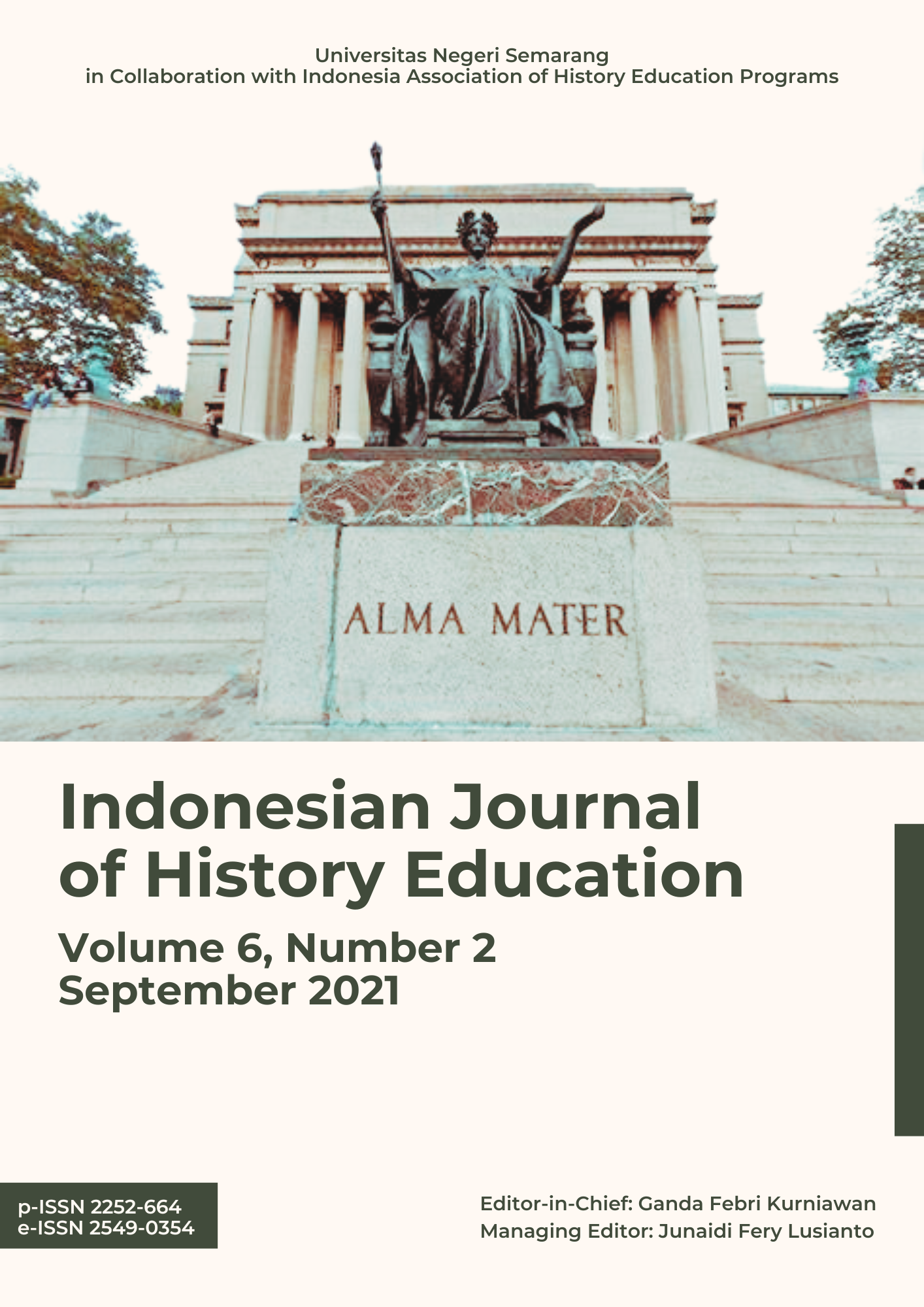The Contribution of the Edmodo-Based Group Investigation Type Learning Cooperative Learning Model Assisted by the Learning Management System (LMS) in Improving the Historical Thinking Skills of History Teacher Prospective Students
Abstract
The organizers carried out at the Siliwangi University History Education department at the time the professor of 2017 showed that their ability to think historically was still not optimal. This is part of the research results, which show that the index of historical thinking averages 53.6%. This study aimed to study various cooperative learning models of inquiry group type assisted by a Learning Management System (LMS) developed to improve the historical thinking skills of prospective history teachers. The research method is classroom action research. The research results in the first cycle showed that the index of historical thinking averaged 70.4%, and in the second cycle, the average historical result was 82.4%. Based on the results in the first and second cycles, using the investigative group learning model and Edmodo learning media can improve students' historical thinking.
References
Darimi, I. (2017). Information And Communication Technologies Sebagai Media Pembelajaran Pendidikan Agama Islam Efektif Era Teknologi Informasi. Cyberspace: Jurnal Pendidikan Teknologi Informasi, 1(2), 111-121.
Erwinsyah, A. (2016). Pengelolaan Pembelajaran Sebagai Salah Satu Teknologi Dalam Pembelajaran. Tadbir: Jurnal Manajemen Pendidikan Islam, 4(2), 80-94.
Hamdi, A. S., & Bahruddin, E. (2015). Metode penelitian kuantitatif aplikasi dalam pendidikan. Deepublish.
Jauhari, M. I. (2018). Peran media pembelajaran dalam pendidikan islam. Piwulang: Jurnal Pendidikan Agama Islam, 1(1), 54-67.
Jayusman, M. I., & Shavab, O. A. K. (2018). Penerapan Media Pembelajaran Multi Media Power Point Dalam Meningkatkan Aktivitas Belajar Calon Guru Sejarah. Candrasangkala: Jurnal Pendidikan dan Sejarah, 4(2), 116-133.
Listiana, L. (2013). Pemberdayaan keterampilan berpikir dalam pembelajaran biologi melalui model kooperatif tipe gi (group investigation) dan ttw (think, talk, write). In Proceeding Biology Education Conference: Biology, Science, Enviromental, and Learning (Vol. 10, No. 1).
Madjid, M. D., & Wahyudhi, J. (2014). Ilmu Sejarah: Sebuah Pengantar. Kencana.
Mais, A. (2016). Media pembelajaran anak berkebutuhan khusus (ABK): Buku referensi untuk guru, mahasiswa dan umum. Pustaka Abadi.
Malawi, Ibadullah, Dewi Tryanasari, and H. S. Apri Kartikasari. (2017). Pembelajaran literasi berbasis sastra lokal. Cv. Ae Media Grafika.
Mariyaningsih, N., & Hidayati, M. (2018). Bukan Kelas Biasa: Teori dan Praktik Berbagai Model dan Metode Pembelajaran menerapkan inovasi pembelajaran di kelas-kelas inspiratif. CV Kekata Group.
Maslihah, M., & Rachmi, T. (2018). Upaya Meningkatkan Percaya Diri Melalui Kegiatan Menyanyi Pada Anak Usia 5-7 Tahun Di RA Tarbiatul Umi Kota Tangerang. Ceria: Jurnal Program Studi Pendidikan Anak Usia Dini, 6(2), 26-36.
Mulyatiningsih, E. (2015). Metode Penelitian Tindakan Kelas. Modul Pelatiihan Pendidikan Profesi Guru: Fakultas Teknik, Universitas Negeri Yogyakarta. Universitas Negeri Yogyakarta.
Murni. (2007). Model Pembelajaran holistik Dalam Pengembangan Keterampilan Berpikir Kesejarahan. Disertasi.
Nellitawati, N., & Aswardi, A. (2017). Efektivitas Pelatihan Metode Penelitian Tindakan Kelas Bagi Guru SD di Kecamatan Padang Timur Kota Padang. Jurnal Aplikasi IPTEK Indonesia, 1(1), 1-5.
Nuraida, D. (2019). Peran guru dalam mengembangkan keterampilan berpikir kritis siswa dalam proses pembelajaran. Jurnal Teladan: Jurnal Ilmu Pendidikan Dan Pembelajaran, 4(1), 51-60.
Rahman, Khadijah Abdul. (2010). The Effectiveness of Learning Management System (LMS) Case Study at Open University Malaysia (OUM), Kota Bharu Campus. Journal of Emerging Trends in Computing and Information Sciences.2.2. 73-79.
Seixas, P., & Peck, C. (2004). Teaching Historical Thinking. Vancouver: Pacific Educational Press.
Shavab, Oka Agus Kurniawan. (2017). Model Pembelajaran Value Clarification Technique (VCT) Dengan Memanfaatkan Learning Management System (LMS) Berbasis Edmodo Dalam Pendidikan Nilai Pada Pembelajaran Sejarah. Prosiding Seminar Nasional Pendidikan FKIP UNTIRTA. 223-230.
Suti, N. K. (2018). Penerapan Model Pembelajaran Kooperatif Tipe Think-Pair-Share (TPS) untuk Meningkatkan Motivasi Belajar Tema Hidup Rukun pada Siswa Kelas II. Journal of Education Action Research, 2(3), 206–211.
Thongmak, M. (2013). Social Network System in Classroom: Antecedents of Edmodo. Journal of e-Learning and Higher Education.
Wibawa, B. (2003). Penelitian tindakan kelas. Jakarta: Dirjen Dikdasmen, 2572-2721.
Wijaya, C., Syahrum, S., & Ananda, R. (2013). Penelitian tindakan kelas: melejitkan kemampuan penelitian untuk meningkatkan kualitas pembelajaran guru.
Wiriaatmadja, Rochiati. (2010). Metode Penelitian Tindakan Tindakan Kelas. Bandung: Rosda.
Yulia, S., & Shavab, O. A. K. (2018). Kontribusi Model Pembelajaran Kooperatif Learning Tipe Group Investigation Berbantuan Learning Management System (LMS) Berbasis Edmodo dalam Meningkatkan Kemampuan Berpikir Historis Mahasiswa Calon Guru Sejarah. Indonesian Journal of History Education, 6(2), 115-122.
Copyright (c) 2021 Indonesian Journal of History Education

This work is licensed under a Creative Commons Attribution 4.0 International License.
Copyright Notice
An author who publishes in the Jurnal Indonesian Journal of History Education agrees to the following terms:
- Author retains the copyright and grants the journal the right of first publication of the work simultaneously licensed under the Creative Commons Attribution-ShareAlike 4.0 License that allows others to share the work with an acknowledgement of the work's authorship and initial publication in this journal
- Author is able to enter into separate, additional contractual arrangements for the non-exclusive distribution of the journal's published version of the work (e.g., post it to an institutional repository or publish it in a book) with the acknowledgement of its initial publication in this journal.
- Author is permitted and encouraged to post his/her work online (e.g., in institutional repositories or on their website) prior to and during the submission process, as it can lead to productive exchanges, as well as earlier and greater citation of the published work (See The Effect of Open Access).
Read more about the Creative Commons Attribution-ShareAlike 4.0 Licence here: https://creativecommons.org/licenses/by-sa/4.0/.




